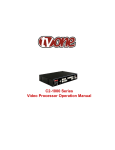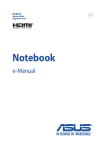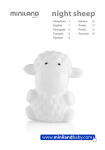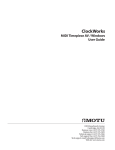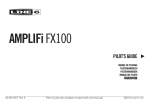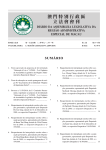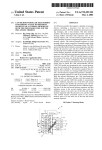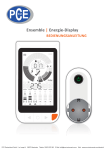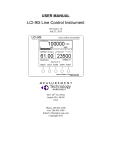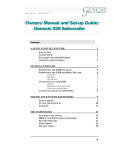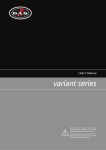Download C3-540 Manual
Transcript
C2-2855 Universal Scaler PLUS C2-2755 Video Scaler PLUS C2-2655 Scan Converter PLUS User Manual V1.12 PDF-UG-C2-2X55 Contents 1 DISCLAIMER .......................................................................................................................... 5 Regulatory Agency Acceptance ......................................................................................................................... 5 European ‘CE’ Mark Statement ......................................................................................................................... 5 FCC Statement .................................................................................................................................................. 5 Manual Copyright Notice ................................................................................................................................... 6 2 SAFETY INSTRUCTIONS ...................................................................................................... 7 3 UNPACKING AND INSTALLATION ..................................................................................... 12 3.1 3.2 3.3 4 4.1 4.1.1 4.1.2 4.2 4.3 4.4 4.5 4.6 4.7 4.8 4.8.1 5 5.1 5.2 5.3 5.4 6 6.1 6.2 6.3 6.4 6.5 6.6 6.7 7 7.1.1 7.1.2 7.1.3 7.1.4 7.1.5 8 8.1 8.2 8.2.1 8.2.2 8.2.3 8.3 8.4 8.5 Shipping Carton................................................................................................................................ 12 Important Safety Instructions ........................................................................................................... 12 Initial Operation Check Using Factory Default Settings ................................................................... 12 QUICK START...................................................................................................................... 13 Overview .......................................................................................................................................... 13 Input/Output Connectivity ................................................................................................................. 13 Output Resolution Support ............................................................................................................... 13 Box Contents .................................................................................................................................... 14 C2-2x55 Connections ....................................................................................................................... 14 Menu Overview ................................................................................................................................ 15 Setting an Output Resolution ........................................................................................................... 15 Switching .......................................................................................................................................... 15 C2-2x55 Architecture ........................................................................................................................ 15 Inputs/Outputs .................................................................................................................................. 16 Universal DVI ................................................................................................................................... 16 PANEL INTERFACE............................................................................................................. 18 Panel Overview ................................................................................................................................ 18 Using the C2-2x55............................................................................................................................ 18 OLED Panel Overview ..................................................................................................................... 19 Primary/Background Indicators ........................................................................................................ 19 MENU OVERVIEW ............................................................................................................... 20 Layering Control ............................................................................................................................... 20 Swapping Layers .............................................................................................................................. 21 Genlock & Framelock & Hiding ........................................................................................................ 21 Scaling Overview.............................................................................................................................. 22 Aspect Ratio Conversion .................................................................................................................. 22 Importing Logos ................................................................................................................................ 22 Importing Items................................................................................................................................. 23 BUTTON NAVIGATION ........................................................................................................ 24 Powering Up ..................................................................................................................................... 24 Button Colors .................................................................................................................................... 24 Menu Navigation .............................................................................................................................. 24 Source Selection & Loading Presets ................................................................................................ 24 Other Useful Selections.................................................................................................................... 25 SHORTCUT & LIVE MENUS ................................................................................................ 27 Overview .......................................................................................................................................... 27 Shortcuts & Live Menu Map ............................................................................................................. 28 Shortcuts .......................................................................................................................................... 28 Live Menu ......................................................................................................................................... 29 Primary ............................................................................................................................................. 29 Background ...................................................................................................................................... 29 Audio ................................................................................................................................................ 29 Layer Order ...................................................................................................................................... 30 2|Page 8.6 8.7 8.8 8.9 8.10 9 Keying .............................................................................................................................................. 30 Freeze .............................................................................................................................................. 31 Preset ............................................................................................................................................... 31 Logo.................................................................................................................................................. 31 Transition .......................................................................................................................................... 31 POPULAR TASKS................................................................................................................ 32 9.1 9.1.1 9.1.2 9.2 9.3 9.4 9.4.1 9.4.2 9.5 9.6 9.7 9.8 9.9 10 Setting up Sources and Outputs ...................................................................................................... 32 Source Set up ................................................................................................................................... 32 Output Set Up ................................................................................................................................... 32 Switching Sources ............................................................................................................................ 32 Customizing Transitions ................................................................................................................... 32 Creating a picture in picture effect ................................................................................................... 33 Resizing the Primary Layer .............................................................................................................. 33 Adding a Background ....................................................................................................................... 33 Adding a Color Field as a Background............................................................................................. 33 Adding a Still Image as a Background ............................................................................................. 34 Adding a logo to a presentation ....................................................................................................... 35 Creating a lower third ....................................................................................................................... 35 Using audio from alternative sources ............................................................................................... 36 SETUP MENU....................................................................................................................... 37 10.1 10.2 10.2.1 10.2.2 10.2.3 10.2.4 10.2.5 10.2.6 10.2.7 10.2.8 10.3 10.3.1 10.3.2 10.3.3 10.3.4 10.3.5 10.3.6 10.3.7 10.3.8 10.3.9 10.3.10 10.3.11 10.3.12 10.3.13 10.3.14 10.3.15 10.3.16 10.3.17 10.3.18 10.4 10.4.1 10.4.2 10.4.3 10.5 10.6 10.7 10.8 10.9 Initial Set Up ..................................................................................................................................... 37 Connections ..................................................................................................................................... 37 HDMI ................................................................................................................................................ 38 Universal DVI ................................................................................................................................... 39 3G/HD/SD-SDI ................................................................................................................................. 39 PC/HD .............................................................................................................................................. 39 YC/CV .............................................................................................................................................. 39 Audio Connections ........................................................................................................................... 40 Phoenix Audio .................................................................................................................................. 40 3.5mm Audio Input ........................................................................................................................... 40 Setup Menu ...................................................................................................................................... 41 Setup Menu Map .............................................................................................................................. 41 System ............................................................................................................................................. 41 Sources ............................................................................................................................................ 42 Audio Source .................................................................................................................................... 42 Input Type ........................................................................................................................................ 42 RGB Settings .................................................................................................................................... 43 YUV Settings .................................................................................................................................... 43 Aspect Ratio ..................................................................................................................................... 43 Align.................................................................................................................................................. 43 On Source Loss ................................................................................................................................ 43 De-Interlace ...................................................................................................................................... 43 Diagonal Interpolate ......................................................................................................................... 44 Noise Reduction ............................................................................................................................... 44 Field Swap ........................................................................................................................................ 44 Field Offset ....................................................................................................................................... 44 Procamp ........................................................................................................................................... 44 EDID ................................................................................................................................................. 44 HDCP ............................................................................................................................................... 45 Outputs ............................................................................................................................................. 46 Connectors ....................................................................................................................................... 46 Video ................................................................................................................................................ 46 Audio ................................................................................................................................................ 47 Preset ............................................................................................................................................... 47 Layers ............................................................................................................................................... 47 Back Color ........................................................................................................................................ 47 Genlocking your unit......................................................................................................................... 48 Layer Order ...................................................................................................................................... 48 3|Page 10.10 10.11 10.12 Keying .............................................................................................................................................. 49 Presets ............................................................................................................................................. 49 Transitions ........................................................................................................................................ 49 11 TROUBLESHOOTING AND TECHNICAL SUPPORT .......................................................... 50 12 FREQUENTLY ASKED QUESTIONS ................................................................................... 51 12.1 12.2 12.3 12.4 12.5 12.6 12.7 12.8 12.9 12.10 12.11 13 13.1 13.2 14 14.1 14.2 There is no picture on the Output. .................................................................................................... 51 There is excessive flicker on the Output. ......................................................................................... 51 The Output image is distorted. ......................................................................................................... 51 Some colors appear to be incorrect on the CV/YC output ............................................................... 51 How can I reduce color smearing on CV connections? ................................................................... 51 I can no longer adjust the Output image resolution. ........................................................................ 51 The picture on the video display is black and white. ........................................................................ 51 The picture on the video display is green......................................................................................... 51 The RGB input is selected but the image is rolling or pink. ............................................................. 52 The video signal from my DVD player does not appear to work. ..................................................... 52 Image is flashing, snow is present, or source image does not appear. ........................................... 52 RETURN PROCEDURE ....................................................................................................... 53 Trouble Shooting .............................................................................................................................. 53 To return a unit for repair .................................................................................................................. 53 WARRANTY POLICY ........................................................................................................... 54 Limited Warranty .............................................................................................................................. 54 Limitations ........................................................................................................................................ 54 4|Page 1 Disclaimer This product is intended for professional and/or home use. This product is not intended for use in a medical environment and does not have the required certifications for such use. Similarly, use aboard any aircraft or spacecraft while in flight or as an adjunct to any surface, airborne or marine navigation system or any offshore marine activity, including control of any watercraft, or any use similar to those specifically herein mentioned is prohibited. Use in the aforementioned circumstances would require additional testing and certification. You have not become the owner of any software - you have merely purchased the right to use the software. You may make one copy of the software for your own use. Other copies will be deemed a breach of copyright. No warranty is made either expressed or implied including but not limited to any implied warranties of merchantability or fitness for a particular purpose. In no event shall the supplier or manufacturer of this product be liable for errors found within, or be liable for any direct, indirect or consequential damages or loss in connection with the purchase or use of this hardware software or manual. The sole and exclusive liability to the supplier and manufacturer regardless of the form of action shall not exceed the replacement cost of the materials described herein. By using this equipment you have indicated that you have agreed to the terms listed above. If you do not wish to agree or the above terms are contrary to your conditions of purchase you may return the equipment, unused, to your supplier. All trademarks and copyrights are acknowledged. E&OE. Regulatory Agency Acceptance European ‘CE’ Mark Statement Emissions: BS EN 55103-1:2009+A1:2012 (Generic Emission Standard for all environments: E1-E5) Immunity: BS EN 55103-2:2009 (Generic Immunity Standard for all environments: E1-E5) FCC Statement Class B Device: This equipment has been tested and found to comply with the limits for a Class B digital device pursuant to Part 15 of the FCC Rules. These limits are designed to provide a reasonable protection against harmful interference when the equipment is operated in all environments. This equipment generates, uses and can radiate radio frequency energy and, if not installed and used in accordance with the Instruction Manual, may cause harmful interference to radio communications. This Class B Digital Apparatus meets all requirements of the Canadian Interference-Causing Equipment Regulations. Cet Appareil Numerique de la Classe B respecte toutes les exigencies du Reglemente Sur Le Material Brouilleur Canada. WARNING: An AC adapter with a ferrite core must be used for RF interference suppression. To assure continued FCC Class B emission limit compliance, the user must only use shielded video cables when connecting to external units. If the HDMI, DVI-U or PC/HD ports are to be used, they must be connected by compatible shielded interface cables with two ferrite cores to avoid potential harmful interference. This equipment has more than one interface connector, do not leave cables connected to unused interfaces. Any unauthorized changes or modifications to this equipment could void the user’s authority to operate it. Direct all inquiries regarding FCC compliance to: tvONE 2791 Circleport Drive, Erlanger, KY 41018, USA Phone: 859-282-7303 Fax: 859-282-8225 Email: [email protected] 5|Page Manual Copyright Notice This Operation Manual is the intellectual property of tvONE, ©2014. No portion of this manual may be copied or reproduced in any manner or by any means, including, but not limited to electronic and electromechanical, without the express written permission of tvONE. 6|Page 2 Safety Instructions To insure the best from this product, please read this manual carefully. Keep it in a safe place for future reference. To reduce the risk of electric shock, do not remove the cover from the unit. No user serviceable parts inside. Refer servicing to qualified personnel. 2.1 Power and connections This unit is not disconnected from the AC power source as long as it is connected to the wall outlet. The off state for this unit is called standby mode. In standby mode the unit is designed to consume a reduced quantity of power compared to normal operating modes. When not using the unit for a long period of time, insure that the AC power cord is disconnected from the wall outlet. The AC wall outlet should be installed near to the unit and be easily accessible. Do not plug in or attempt to operate an obviously damaged unit. 2.2 Water and moisture To reduce the risk of fire and personal injury, operation of this device outdoors and/or exposure to rain, water or excessive moisture is expressly prohibited. The apparatus shall not be exposed to dripping or splashing and no objects filled with liquids, such as vases, shall be placed on the apparatus. 2.3 General care Do not force switches or external connections. When moving the unit, disconnect the serial port connections first then the power cable and finally the interconnecting cables to other devices. Do not attempt to clean the unit with chemical solvents or aerosol cleaners, as this may damage the unit. Use a clean dry cloth. 2.4 Location Installation of this unit should be in a cool dry place, away from sources of excessive heat, vibration, dust, moisture and cold. 2.5 Ventilation Slots and openings in the sides of the unit are provided for ventilation. To ensure reliable operation, avoid obstruction of these openings and ensure the unit is installed in a well-ventilated area. 2.6 Intellectual property Some IC chips in this product include confidential and/or trade secret property. Therefore you may not copy, modify, adapt, translate, distribute, reverse engineer, reverse assemble or decompile the contents thereof. 7|Page 2.0 IMPORTANT: CONSIGNES DE SECURITE Afin de tirer le meilleur de ce produit, merci de lire attentivement ce manuel. Gardez-le dans un endroit sûr pour pouvoir le consulter à nouveau. Afin de réduire le risque de choc électrique, ne retirez pas l’unité de sa protection. Aucune pièce réparable par l’utilisateur à l’intérieur. Référez-vous à des personnes qualifiées. 2.1 Alimentation électrique et connexions Cette unité n’est pas déconnectée de la source de courant électrique tant qu’elle est connectée à la prise murale. Le mode éteint de cette unité est appelé mode de veille. En mode de veille, cette unité est conçue pour consommer une quantité réduite de courant par rapport aux modes normaux d’utilisation. Lorsque vous n’utilisez pas l’unité pendant une longue période, assurez-vous que le câble d’alimentation électrique est déconnecté de la prise murale. La prise murale de courant doit être installée près de l’unité et aisément accessible. Ne branchez pas et n’essayez pas d’utiliser une unité visiblement endommagée. 2.2 Eau et humidité Pour réduire les risques d’incendie et de dommages corporels, l’utilisation de cet appareil à l’extérieur et/ou son exposition à la pluie, l’eau ou une humidité excessive est expressément interdite. L’appareil ne doit pas être exposé aux gouttes ou aux éclaboussures et aucun objet contenant de l’eau, comme par exemple un vase, ne doit être posé sur l’appareil. 2.3 Entretien général Ne forcez pas les boutons ou connexions externes. Lorsque vous déplacez l’unité, déconnectez d’abord les connexions de ports en série puis le câble d’alimentation et enfin les câbles de connexion avec d’autres appareils. N’essayez pas de nettoyer l’unité avec des dissolvants chimiques ou des produits nettoyants en aérosol, car cela peut endommager l’unité. Utilisez un chiffon propre et sec. 2.4 Emplacement L’installation de cette unité doit se faire dans un endroit frais et sec, éloigné de sources excessives de chaleur, de vibrations, de poussière, d’humidité et de froid. 2.5 Aération Les rainures et les ouvertures sur les cotés de l’unité servent à l’aérer. Pour permettre une utilisation sûre, évitez d’obstruer ces ouvertures et assurez-vous que l’unité est installée dans un endroit bien aéré. 2.6 Propriété intellectuelle Certaines puces IC dans ce produit contiennent des éléments propriétaires confidentiels et/ou des secrets commerciaux. Vous ne devez donc pas copier, modifier, adapter, traduire, distribuer, démonter, désassembler, ou décomposer leur contenu. 8|Page 2.0 INSTRUCCIONES IMPORTANTES DE SEGURIDAD Para sacar el mejor provecho de este producto, léase este manual con detenimiento. Guárdelo en un lugar seguro para poder hacerle referencia en el futuro. Para reducir el riesgo de calambre, no quite la cubierta del aparato. No hay piezas utilizables dentro. Remítase todo mantenimiento a personal cualificado. 2.1 Corriente y conexiones Mientras esté conectada a una toma de electricidad, el aparato seguirá conectado a la fuente de corriente CA. A la posición de «off» de este aparato se le denomina posición de espera. En la posición de espera, el aparato está diseñado a consumir una cantidad reducida de electricidad en comparación con los modos de operación normales. Asegúrese de desconectar el cable de corriente CA de la toma de la pared cuando no va a utilizar el aparato por un periodo largo de tiempo. La toma CA de la pared ha de estar instalada cerca del aparato y debe ser fácilmente accesible. No enchufe ni intente operar un aparato que esté evidentemente dañado. 2.2 Agua y humedad Para reducir el riesgo de fuego o de daños personales, se prohíbe la utilización de este aparato en el exterior y/o su exposición a la lluvia, al agua o a atmósferas de excesiva humedad. El aparato no debe situarse cerca de zonas en las que haya riesgo de goteo o salpicaduras. Tampoco deben colocarse objetos que contengan agua (jarrones, por ejemplo) en el mismo. 2.3 Cuidado general No forzar interruptores o conexiones externas. Al mover el aparato, desconecte las conexiones del puerto en serie primero, luego el cable de electricidad y finalmente los cables interconectados a otros aparatos. No intente limpiar el aparato con disolventes químicos o productos de limpieza aerosol, ya que podrían dañar el aparato. Utiliza un paño limpio y seco. 2.4 Ubicación Este aparato se debe instalar en un lugar seco y fresco, lejos de fuentes de calor excesivas, la vibración, el polvo, la humedad y el frío. 2.5 Ventilación El aparato viene provisto de ranuras y agujeros en los lados para la ventilación. Para asegurar una operación eficaz, se debe evitar la obstrucción de estos agujeros y también asegurar que el aparato se instale en una zona con adecuada ventilación. 2.6 Propiedad intelectual Algunos chips con circuito integrado de este producto incluyen propiedad confidencial y/o propiedad de secreto comercial. Por lo tanto queda prohibido copiar, modificar, adaptar, traducir, distribuir, usar técnicas retroactivas, desmontar, o recopilar los contenidos del mismo. 9|Page 2.0 WICHTIGE SICHERHEITSVORSCHRIFTEN Lesen Sie diese Bedienungsanleitung bitte sorgfältig, um Ihr Produkt optimal nützen zu können, und bewahren Sie sie zum späteren Nachschlagen an einem sicheren Ort auf. Entfernen Sie bitte keinesfalls die Abdeckung, um der Gefahr eines Stromschlags vorzubeugen. Im Inneren des Geräts befinden sich keine Teile, die vom Benutzer gewartet werden können. Lassen Sie Wartungsarbeiten nur von Fachpersonal durchführen. 2.1 Stromversorgung und anschlüsse Solange das Gerät mit einer Steckdose verbunden ist, bleibt die Stromversorgung aufrecht. Der Ausschaltzustand des Geräts wird als Standbymodus bezeichnet. Im Standbymodus verbraucht das Gerät weniger Strom als in den üblichen Betriebsarten. Wird das Gerät über einen längeren Zeitraum hinweg nicht verwendet, ziehen Sie bitte das Stromkabel aus der Steckdose. Die Steckdose sollte sich in der Nähe des Geräts befinden und leicht zugänglich sein. Verbinden Sie ein offensichtlich beschädigtes Gerät keinesfalls mit einer Steckdose und versuchen Sie auch nicht, es zu bedienen. 2.2 Wasser und feuchtigkeit Um die Gefahr eines Brandes oder einer Körperverletzung zu verringern, ist es ausdrücklich verboten, dieses Gerät im Freien in Betrieb zu nehmen und/oder es Regen, Wasser oder hoher Feuchtigkeit auszusetzen. Das Gerät darf keinen Tropfen oder Spritzern ausgesetzt werden und es dürfen keine mit Flüssigkeiten gefüllte Behälter, wie Vasen, auf das Gerät gestellt werden. 2.3 Allgemeine pflege Wenden Sie bei der Handhabung von Schaltern und Anschlüssen keine Gewalt an. Beim Umstellen des Geräts entfernen Sie zuerst die seriellen Anschlüsse, dann das Stromkabel und zum Schluss die Verbindungskabel zu anderen Geräten. Versuchen Sie keinesfalls, das Gerät mit chemischen Lösungsmitteln oder Sprayreinigern zu reinigen, da dies das Gerät beschädigen könnte. Verwenden Sie ein sauberes, trockenes Tuch. 2.4 Aufstellung Das Gerät sollte an einem kühlen, trockenen Ort aufgestellt werden, fern von übermäßiger Wärme, Vibrationen, Staub, Feuchtigkeit und Kälte. 2.5 Belüftung Seitliche Schlitze und Öffnungen sorgen für die Belüftung des Geräts. Um die ordnungsgemäße Belüftung zu gewährleisten, dürfen diese Öffnungen nicht verdeckt werden. Sorgen Sie außerdem dafür, dass das Gerät an einem gut belüfteten Ort aufgestellt wird. 2.6 Gewerbliches eigentum Einige integrierte Schaltkreise in diesem Produkt enthalten vertrauliche Informationen und/oder Betriebsgeheimnisse. Sie dürfen daher diese Inhalte nicht kopieren, modifizieren, adaptieren, übersetzen, verteilen, rückentwickeln, rückassemblieren oder dekompilieren. 10 | P a g e 2.0 BELANGRIJKE VEILIGHEIDSINSTRUCTIES Lees deze handleiding zorgvuldig door om het beste uit uw product te halen. Bewaar het op een veilige plek voor raadpleging in de toekomst. Haal nooit het omhulsel van de eenheid af, dit om de kans op een elektrische schok te verminderen. Maak het apparaat nooit open: er bevinden zich geen door de gebruiker in te stellen onderdelen in het apparaat. Laat service en onderhoud over aan een gekwalificeerde technicus. 2.1 Elektriciteit en aansluiting Deze eenheid is niet van de wisselstroom voedingsbron gescheiden wanneer de stekker nog in het stopcontact zit. Wanneer de eenheid uitstaat, staat deze nog in de stand-by modus. In de stand-by modus vergt de eenheid minder stroom dan in de normale "aan" modus. Wanneer u de eenheid voor langere tijd niet gebruikt, zorg er dan voor dat de stekker van het wisselstroomsnoer uit het stopcontact is getrokken. Het wisselstroom stopcontact moet dichtbij de eenheid geïnstalleerd worden en makkelijk toegankelijk zijn. Als de eenheid duidelijk beschadigd is moet u deze nooit op het lichtnet aansluiten of bedienen. 2.2 Water en vocht Om het risiko op brand en persoonlijk letsel te beperken is het gebruik van dit apparaat buiten en/of blootstelling aan regen, water of overdadige hoeveelheden vocht uitdrukkelijk verboden. Het apparaat mag niet worden blootgesteld aan druppels of bespatting en er mogen geen objecten die gevuld zijn met vloeistoffen, zoals vazen, op het apparaat geplaatst worden. 2.3 Algemeen onderhoud Forceer schakelaars of externe aansluitingen nooit. Bij verplaatsing van de eenheid, de seriële poortaansluitingen eerst loskoppelen, dan de voedingskabel en als laatste de snoeren naar andere apparaten. Probeer de eenheid nooit met chemische oplosmiddelen of schoonmaakmiddelen in een spuitbus schoon te maken, omdat dit de eenheid kan beschadigen. Gebruik een schone droge doek. 2.4 Plaatsing Deze eenheid moet geïnstalleerd worden op een koele droge plaats, uit de buurt van bronnen van extreme hitte, vibraties, stof, vocht en kou. 2.5 Ventilatie De sleuven en openingen aan de zijkant van de eenheid zijn voor ventilatie. Zorg er voor dat de eenheid op een goed geventileerde plek geïnstalleerd wordt zodat deze betrouwbaar werkt. 2.6 Intellectueel eigendom Sommige IC chips in dit product bevatten vertrouwelijke informatie en/of fabrieksgeheimen. U mag daarom de inhoud hiervan niet kopiëren, wijzigen, aanpassen, vertalen, verspreiden, nabouwen, of decompileren 11 | P a g e 3 3.1 UNPACKING AND INSTALLATION Shipping Carton Your unit will arrive boxed with internal foam inserts for maximum protection during shipping. You are encouraged to retain the box and all packing material so the unit can be returned in the unlikely event that repairs should ever become necessary. 3.2 Important Safety Instructions The AC power cable furnished with the unit should conform to the type in use in your country. Please compare the plug on your cable with the power socket where the unit will be installed. If you did not receive the correct cable, DO NOT attempt to modify it. Instead, immediately contact your dealer or contact TV One at the sales office nearest to your geographic location and request the proper cable. Installation should be made such that the system vents are not blocked by other pieces of equipment. 3.3 Initial Operation Check Using Factory Default Settings This product can be operated via multiple methods, but for the purposes of initially acquainting you with the operation of the unit, this manual will address the operation using the front panel. If you have problems using the unit as described below, see the ‘Firmware Update’ description. 12 | P a g e 4 Quick Start 4.1 Overview Thank you for choosing a tvONE C2 Product. This manual applies to all members of the C2-2x55 family of products. Depending on the unit you have purchased, you may find that some of the functionality and I/O connectivity is not supported on the model you have purchased. The C2-2855 is a Six Input Universal Scaler/Switcher with an advanced user interface together with support for a Still Images and a Logo Layer. The C2-2855 has six video inputs, five video outputs, together with audio in and out via Phoenix connectors and a 3.5mm Line Input. The tables below illustrate the key differences between the models in the range. The C22855 supports all functionality discussed in this manual, the C2-2655 and C2-2755 support less I/O connections and less output resolutions. 4.1.1 Input/Output Connectivity SDI Out CV Out YC Out DVI-U Out HDMI Out PC/HD In SDI In CV In YC In DVI-U In HDMI In Model C2-2855 Universal Scaler PLUS DVI-I only C2-2755 Video Scaler PLUS C2-2655 Scan Converter PLUS 4.1.2 Output Resolution Support 800x600 112Hz 800x600 95Hz 800x600 85Hz 800x600 75Hz 800x600 72Hz 800x600 60Hz 800x600 56Hz 720x576 50Hz 720x480 59.94Hz 640x480 138Hz 640x480 117Hz 640x480 85Hz 640x480 75Hz 640x480 72Hz 640x480 67Hz 640x480 60Hz PAL 625i NTSC 525i Model C2-2855 Universal Scaler PLUS C2-2755 Video Scaler PLUS C2-2655 Scan Converter PLUS 13 | P a g e 1280x768 85Hz 1600x1200 60Hz 1400x1050 75Hz 1400x1050 60Hz 1400x1050 60Hz Rb 1280x720 23.98Hz 1280x720 24Hz 1280x720 25Hz 1280x960 72Hz 1280x960 85Hz 1280x1024 60Hz 1280x1024 70Hz 1280x1024 85Hz 1280x1024 75Hz 1920x1080 25Hz 1920x1080 59.94Hz 1920x1080 50Hz 1920x1080 30Hz 1920x1080 29.97Hz 1280x768 60Hz 1280x768 75Hz 1280x768 60Hz Rb 1024x768 89Hz 1280x960 60Hz 1920x1200 60Hz Rb 1920x1200 50Hz Rb 1920x1080 60Hz 1024x768 85Hz 1280x800 85Hz 1280x720 29.97Hz 1280x720 30Hz 1024x768 75Hz 1280x800 75Hz Scan Converter PLUS 1024x768 70Hz C2-2655 1280x800 60Hz Video Scaler PLUS 1024x768 60Hz C2-2755 1920x1080 24Hz 1920x1080 23.98Hz 1920x1080i 60Hz 1920x1080i 59.94Hz 1920x1080i 50Hz 1920x1080i 48Hz 1920x1080i 47.96Hz 1680x1050 60Hz Universal Scaler PLUS 1280x800 60Hz Rb C2-2855 1024x768 59.94Hz Box Contents 4.2 1400x900 60Hz Scan Converter PLUS 1280x720 60Hz C2-2655 1365x1024 75Hz Video Scaler PLUS 1360x768 60Hz C2-2755 1280x720 59.94Hz Universal Scaler PLUS 1280x720 50Hz C2-2855 C2-2855 Universal Scaler PLUS C2-2755 Video Scaler PLUS C2-2655 Scan Converter PLUS 1 x tvONE C2-2x55 unit 1 x 12V DC Power Supply Unit and IEC Cable 1 x USB Pen Drive (Contains the user manual and software) 4 x Rubber Feet 1 x Safety Registration Sheet 1 x Product Registration Card Please upgrade your C2-2x55 with the latest software which can be downloaded from www.tvone.com/support. 4.3 C2-2x55 Connections To prepare your unit for first use, plug in the locking Power Supply and connect your inputs, outputs and (optional) control PC. 14 | P a g e Note; The unit shown is the C2-2855 – depending on the model you have purchased, some I/O connections may be missing. 4.4 Menu Overview The C2-2x55 has three sets of menus:Live Shortcuts Provides end user functionality Provides quick access to user settings Setup Used to configure the system settings Presets, Source Switching Picture In Picture (PIP) control, Keying, Freeze, Logo Selection, Source Selection, Audio Selection Inputs, Outputs, Layers, Presets and Transitions. 4.5 Setting an Output Resolution It is possible to select from many output resolutions depending on your model – to access the output resolution of your choice select it from the Setup/Outputs/Video/Resolution menu. 4.6 Switching In normal use the C2-2x55 is controlled using Presets and Source Switching:Presets – Pressing the Preset front panel put the C22x55 into Preset Mode. Then press the relevant buttons marked “1-6” to switch between the Presets. Sources – Pressing the back arrow in any menu will take you to the top level menu on the OLED display. Then navigate to the Live/Primary or Live/Background menu and press the relevant buttons marked “1-6” to switch between the sources. 4.7 C2-2x55 Architecture The C2-2x55 range uses CORIO™ 2.5 technology at its core for control of Inputs, Outputs, Scaling, Layering, Audio Management, Still Images and Logo Layering. 15 | P a g e The six video inputs are spread across three gateways into the scaler together with three output gateways to manage the five video outputs. Using the Universal DVI (DVI-U) Input and Output additional connectivity is possible directly for DVI-D, DVI-A and via Dongle for HDMI, PC/HD, CV & YC connection. Note; C2-2655 does not support SDI Input. The C2-2755 only supports DVI-I output and does not support SDI, YC and CV outputs. Audio Input is possible via Phoenix Connectors (3 x stereo) and also via a 3.5mm Line Input (1 x Stereo). Audio Output is via Phoenix Connectors (1 x Stereo) or on any format supporting embedded audio (HDMI, DVI-D + SDI). Within the CORO 2.5 Scaler it is possible to add Still Images and Logos together with defining a Back Color. 4.8 Inputs/Outputs Input Output HDMI Yes Yes Universal DVI Yes Yes 3G/HD/SD-SDI Yes Yes PC/HD Yes No YC Yes Yes CV Yes Yes Phoenix Audio Yes Yes 3.5mm Audio Yes No * Supports RGB, YUV & YPbPr 4.8.1 Remarks Natively for DVI-D, DVI-A & via Dongle for HDMI, PC/HD, CV & YC* BNC connector for Broadcast SDI Connection using HD15 connectors Supports RGB, YUV & YPbPr 3 Stereo inputs & 1 stereo output (centre pin is Ground) Stereo line in Universal DVI Universal DVI (DVI-U) is a tvONE led standard that uses a series of DVI adaptors to connect to a wide range of digital and analog signals even those with embedded audio. 16 | P a g e This gives great flexibility for end users and gives you instant access to additional inputs and outputs: Digital: HDMI, DVI-D, DVI-A Analogue: RGBHV, RGBs, YUV, YPbPr, CV and Y/C HDMI Composite Video PC/HD (RGBHV, RGBs, YUV) S-Video Y/C YPbPr 17 | P a g e 5 Panel Interface 5.1 Panel Overview The front panel uses a powerful combination of coordinated menus and colored backlit buttons to immediately indicate the unit state. All modes can be accessed using the context sensitive, front panel buttons. The buttons can be used for multiple functions and light up in different colors to indicate the current unit state. 5.2 Using the C2-2x55 The C2-2x55 is designed to be commissioned using the Setup menus and then used in Live mode. In Live mode the numbered buttons are used to select the various sources. Alternatively if the Preset button is toggled, the same buttons can be used to recall Presets. By pressing and holding the ‘Alt’ Selection button you can quickly access a Shortcuts menu where the most frequently used menu items can be easily accessed by the numeric keypad. The six options are: 1: Views… 2: 3: 4: 5: 6: Keying Freeze Logos… Source… Audio… Select the Primary and Background sources, Fullscreen/Picture in Picture Settings, Genlock, Framelock, Zoom, Size, Opacity, Crop, Border & Opacity. Enables keying as per the Live menu keying settings. Freezes the Primary Video. Enabling Logo layering, Logo Positioning, Opacity, Logo Border. Used to change the Primary and Background Sources. Selects the audio input to be embedded on the video output. 18 | P a g e 5.3 OLED Panel Overview The OLED displayed menu displays a host of useful information on its four line display. The OLED display shows where you are within the menu structure and the current set up of the unit. The current menu position is shown as a dynamic menu tree with the selected menu shown on the left. The status indicators shows the current set up of the unit including layering control, Keying, Freeze and Logo selection. When navigating through menus, menus are displayed on black, light grey or dark grey: Light Grey Dark Grey Black 5.4 Current Selection Current menu navigation position Not selected Primary/Background Indicators On the OLED display there are a number of useful indicators that show the current set up of the Primary and Background layers. The current state of the settings on the Primary and Secondary layers are indicated in the display: Primary Video Layer Full Screen Background Video Layer Full Screen & Genlocked Picture-in-Picture Hidden & Genlocked Hidden Hidden & Frame Locked Hidden 19 | P a g e 6 Menu Overview The system has been designed with a Setup, Live and Shortcut menus. The Setup menu is typically used by the unit Installer to configure the system settings, while the Shortcuts and Live menus provide operator functionality:Menu Functions Setup System Settings, Inputs, Outputs, Layers, Presets and Transitions Preset Recall, Source Selection, Picture-in-Picture (PIP) Control, Swapping Layers, Audio Routing, Logo Selection, Image Freezing and Fade to Black. Quick access to Views, Keying on/off, Freeze on/off, Logos, video Source Selection and Audio sources Live Shortcuts More information on the menus can be found in later chapters of this manual. 6.1 Layering Control The C2-2x55 can control layering of Logo’s, Primary & Background video and a Color Field. This adds great flexibility to simple control of layering and external referencing. The Primary Layer can have Scaling, keying and Aspect Ratio Correction (ARC) applied. Using the available layers it is possible use Layer Swapping and Scaling to make changes using a variety of sources: Layer Sources Layer Scaling Visibility Remarks Logo Imported Logo Always in front of other layers None available Either On or Off Primary All Inputs & Stills Can be swapped with Background Available Can be Hidden or Visible Logo imported using supplied Control Software. It can be Keyed, Opacity changed and positioned. Still images imported using supplied Control Software. Can only be displayed in Primary Layer. Background All Inputs None Color Field User defined RGB Color Can be swapped with Primary Always behind other layers Can be Hidden or Visible Always present but is not seen if other layers are selected full frame None 20 | P a g e 6.2 Swapping Layers For simple layer priority control between two active layers there is a Swap command – this allows P/B (Primary over Background) or B/F (Background over Primary). Swap is most commonly used when you want to key over a Still Image (SIS) as a SIS can only applied to the Primary layer. In this example we have a weather map still (SIS) and a video input of a presenter. Primary/Background Simply set the Layer priority to B/F (Background over Primary) and then go to Keying (also in the Live menu) and apply your key. Background/Primary 6.3 Genlock & Framelock & Hiding It is possible to view or lock sources. The current set up of the unit is displayed in the OLED display. If only a Primary source is configured, then full controlling of scaling and output resolutions is possible. When both a Primary and Background source are used the output must be locked to the Background Input. There are several different scenarios: Possible Configurations Full Screen Picture-In-Picture or Hidden Full Screen and Genlocked*, Hidden and Framelocked#, Hidden & Frame Locked or Hidden. *Genlock = Output is set to Background size and frame rate. # Framelock = Output size can be set by scaler but frame rate is taken from the Background input. Primary Background 21 | P a g e 6.4 Scaling Overview The CORIO™2.5 Scaler is a flexible tool and offers many different settings: Crop Cropping cuts into the edge of the scaled layer. Place Controls the Position and Size of the Scaled Image. Image Flip Allows the output image to be flipped Vertically, Horizontally or both – most commonly when a video projector is ceiling mounted, or for special effects. Border A colored border can be added to the outside of a scaled layer. Keying Keying is possible through a specified color or a Luma Key through black or white. Defaults are also made available for common colors (green, blue, etc). Image Smoothing Reduces the jagged-edges sometimes seen within an output image by softening it. It typically improves the quality of a scaled image greatly. There are four possible settings for this adjustment: “Off”, “Med.”, “High”, and “Auto”. The “Auto” setting is generally thought to be most desirable and will vary the smoothing process according to the amount of zoom taking place. Flicker Reduction Used if you have selected a low resolution interlaced output such as PAL or NTSC. If you are using CV or YC outputs, this adjustment may be of interest, particularly when you have line drawings or similar fine detail. You can choose from four possible Flicker Reduction settings. You should use as little Flicker Reduction as possible because the Vertical detail will be softened at the highest setting. Temporal Interpolation When using Frame Rate conversion additional frames will be added by repeating neighbouring frames. For example if the input is 50Hz and the output is 60Hz then without using Temporal Interpolation every 5th frame is simply repeated (thus adding 10 frames per second). To give a smoother result Temporal Interpolation can be used which merges the neighbouring frames instead. 6.5 Aspect Ratio Conversion It is possible to adjust the Aspect Ratio Conversion of the Sources and Outputs: Fill The image fills the output resolution even if this means the Aspect Ratio is incorrect. H-Fit The image fills the output resolution Height even if this means the Aspect Ratio is incorrect. V-Fit The image fills the output Height resolution even if this means the Aspect Ratio is incorrect. 1:1 The input is matched pixel for pixel to the output even if this means the Aspect Ratio is incorrect. 6.6 Importing Logos Logos can be imported using the supplied CORIOcontrol Software where it can be resized and keyed as required. Using the C2-2x55 menu, the logo layer can be shown/hidden, repositioned and opacity applied. 22 | P a g e 6.7 Importing Items Still Images can be imported using the supplied CORIOcontrol Software where it can be resized as required. Using the C2-2x55 menu, the Stills can be used as the Primary video source and manipulated accordingly. 23 | P a g e 7 Button Navigation 7.1.1 Powering Up The on/off button is used to take the unit in and out of standby mode. To prevent accidental power off events, the button requires a press-and-hold to turn the unit on or off The On/Off button has four operation states: On/Off Other Buttons Unit State Red White No Backlighting Green Off All display in White Illuminated Off Power supply connected with unit in standby mode On/Off button has been selected and the unit is initialising. Unit operational Unit display is turned off, press any key to resume 7.1.2 Button Colors The panel buttons display in various colors and in lit/unlit modes to indicate current system status or available menu options to allow quick selections: Red Orange White Unlit Purple Blue 7.1.3 Presets Selection, Unit in Standby, and Valid Audio Sources Source Selection Available menu selections Unavailable menu Primary/Background Audio Selection Shortcuts and Audio Mute Menu Navigation These navigation buttons are used to move to a chosen menu and select it. Valid navigation selections are highlighted using backlighting. Holding the ‘ok’ button down will save all System Settings which will be used the next time that the unit is power cycled. The Back button allows you to navigate back to the Home menu step by step. Where alternate values greater than “1-6” are available selecting this button allows access to value from 7-12. Holding the button for three seconds will access the Shortcuts menu. 7.1.4 Source Selection & Loading Presets These buttons are used for Source Selection, quick selection of menu items and values together with loading Presets. 24 | P a g e The Preset button is a hot key that is used in conjunction with the “1-6” buttons for recall of Presets. Presets – Pressing the Preset front panel put the C22x55 into Preset Mode. Then press the relevant buttons marked “1-6” to switch between the Presets. Sources – Pressing the back arrow in any menu will take you to the top level menu on the OLED display. Then navigate to the Live/Primary or Live/Background menu then press the relevant buttons marked “1-6” to switch between the sources. 7.1.4.1 Controlling Presets Presets Capturing Press Preset then Press and hold a “1-6” button Recall Press Preset then Push a “1-6” button briefly Delete Press Preset then Press and hold a “1-6” button for longer than Capturing Load the Default Preset Press and Hold the Preset Button Access Presets 7-12 Press Preset then Toggle the ‘Alt’ button and a “1-6” button 7.1.4.2 Controlling Sources Sources 7.1.5 Switch Source Push a “1-6” button briefly Access Settings Right button Other Useful Selections Navigation Back navigation Press Back Button 25 | P a g e Saving Save Settings Press & Hold the ‘ok’ button unti the message “Settings Saved” appears Panel Lock Panel Lock/Unlock Press Alt and then Back until you hear a beep and the display will read, ‘Panel Locked’. Reset Factory Reset Press ‘ok’, Back & Standby for 3 seconds and you will here a beep. 26 | P a g e 8 Shortcut & Live Menus 8.1 Overview Once the C2-2x55 has been configured most daily operations will be completed using Shortcuts menu and the Live menu. It is also possible to access the various related elements of the Setup menu from the Live menu through numerous “Settings” sub menus if required. In essence the unit will be used in one of four ways:- Presets 12 Presets can be stored and instantly recalled. To navigate to the Presets menu, toggle the Preset key and then select the required preset buttons using the “1-6” number keypad. Source Change To change a source, make sure you are in the Live menu, then select primary or background to change the source by selection of 1-6 on the number keypad. For ease of use, 1 = DVI, 2=HDMI, 3=SDI, 4=PC/HD, 4= YC and 5=CV. Shortcuts Menu Live Menu To select the Shortcuts menu, hold down the Alternate Selection button for 4 seconds or navigate to the home menu and navigate down to the Shortcuts menu. Then use the “1-6” number keypad to select the chosen setting. For reference, 1 = Views, 2= Keying, 3 = Freeze, 4 = Logos, 5 = Sources and 6 = Audio. The Live menu can be accessed from the home OLED Screen. To navigate to the home screen from any menu location, press the Back key repeatedly then navigate to your chosen menu item. 27 | P a g e 8.2 Shortcuts & Live Menu Map Key aspects of the Live menu can be also be accessed through a Shortcuts menu – the Shortcut items are shown in red overlaid on the on the Live menu map:- 8.2.1 Shortcuts The Shortcut menus offer a simple and quick method to access the most used settings for normal use of the C2-2x55. The Shortcut menu is accessed from the top menu by scrolling down to Shortcuts then hitting ok, or can be accessed at any time by holding down the Alt key. Make a selection on the number keypad corresponding to the desired selection on the menu. 1 Views 2 3 4 5 Keying Freeze Logos Sources 6 Audio Gives you access to the Primary and Background menus to allow change of source, Picture In Picture and Referencing. Toggles Keying on and off. Key settings are available from the Live or Setup menus. Freezes the Primary layer. Gives access to the stored logos. Gives you access to the Primary and Background menus to allow change of source, Picture In Picture and Referencing. Allows the choice of audio input which is output from the C2-2x55. 28 | P a g e 8.2.2 Live Menu The Live menu is focussed on the key tasks that will be used during normal operations following the initial system configuration and can be accessed by holding down the back button and navigating to the Live menu:Primary Background Audio Layer Order Freeze Preset Logo Transition 8.2.3 Source, View (Full Screen, PIP or Hidden) Source, View (Full Screen Hidden, or None) Follow Primary, Follow Background, A1, A2, A3, 3.55 or mute Primary/Background or Background Primary Freeze Primary Layer Preset Recall, Save, Delete or Default Logo selection Transition Selection Primary The Primary menu allows the selection of Sources, Source Settings, and Picture-in Picture (PIP) modes together with scaler control for Cropping, Placement, Borders, and Keying etc. The input can be set Full Screen, PIP or Hidden. After entering the Primary menu you can quickly switch to a source by either navigating down to the desired source and selecting ‘ok’ or by pushing one of the “1-6” numerical selection buttons. Provides a quick route to the Input Setup, refer to the Setup Chapter of this manual for more information about these View Source Selection Source Settings 8.3 Background View The input can be set as Full Screen (Genlock), Hidden (Genlock), Hidden (Framelock) or None (Scaler). Genlock locks the output to the resolution and frame rate of the Background Input whilst Framelock utilizes the user set resolution but locks the output to the same frame rate as the input. If ‘None (Scaler)’ is selected it is possible to use the full range of scaler settings and output resolutions/frame rates. View Settings It is possible to select the Background Source, view the incoming resolution and set the Opacity of the Background. Source Selection After entering the Background menu you can quickly switch to a source by either navigating down to the desired source and selecting ‘ok’ or by pushing one of the “1-6” numerical selection buttons. Provides a quick route to the Input Setup, refer to the Setup Chapter of this manual for more information about these Source Settings 8.4 Audio The C2-2x55 has a powerful audio toolset for the embedded of various audio signals onto the output. 29 | P a g e Audio Output Selection Audio Follow Mute Audio can embedded to the output from the following inputs: HDMI, DVI-U (DVI & HDMI), SDI, 3.5mm audio and Phoenix Audio (A1, A2 & A3). The audio output can be set to follow either the Primary or Background layer. If no audio is required to be output, the unit can be set to Mute. 8.5 Layer Order It is possible to change the priority of the Primary and Background layers. P/B B/P In this mode the Primary is displayed over the Background layer and Scaling, Keying can be applied to the Primary. The Background is applied over the Primary and keying can be applied to the Background layer. The layer order is most commonly used when you want to key over a Still Image (SIS) as a SIS can only applied to the Primary layer. In this example we have a weather map still (SIS) and a video input of a presenter. Primary/Background Simply set the Layer priority to B/F (Background over Primary) and then go to Keying (also in the Live menu) and apply your key. Background/Primary 8.6 Keying The Keyer can be used for Broadcast and Digital Signage Applications and can be enabled and disabled. 30 | P a g e For Broadcast applications it is possible to key through any background – eg Blue Screen, Green Screen, etc with full control over RGB values. For Digital Signage applications it is possible to key over a lower third by applying a Luma Key through black or white. For information on setting up Key values, refer to the Setup menu chapter of this manual. 8.7 Freeze Freeze will Freeze frame the video displayed on the Primary layer only. 8.8 Preset Menu access to the stored Presets and to a default Preset which defaults all Scaler settings. 8.9 Logo Choose from one of five stored logos. 8.10 Transition It is possible to select from a variety of transition types (Cut, Fade, Push and Wipe) and configure their Duration using the right cursor. 31 | P a g e 9 Popular Tasks 9.1 9.1.1 Setting up Sources and Outputs Source Set up To set up a new Source enter the System menu and select Sources. In the Sources menu you can select between Inputs, SIS (Still Images) or Logos – select Inputs. Next select the Input you require – for this example we will select HDMI. The key menu items you will need to select to configure your Source are: HDCP Aspect Ratio 9.1.2 The default mode for HDCP is Off – select On for HDCP sources, Select the correct Aspect Ratio from Fill (stretches image to fill the screen), Aspect (maintains the source aspect ratio), H-fit (fits the image horizontally), V-fit (fits the image Vertically) or 1:1 (resizes the image to pixel matching between the source and output). Output Set Up To set up an output enter the System menu and select Sources and select the Connector – for this example we select HDMI and the key menu items you need to select is: The default mode for HDCP is Off – select On for HDCP sources, HDCP Now return to the Outputs menu and select the Video sub menu. Key menus are: Resolution Enable Layers Select a chosen resolution from a large number of preset values. Displays the ‘Back Color’ only, both Primary and Background video sources are removed. Note; The Resolution setting will only have an effect if the Background View mode is either ‘None (Scaler)’ or ‘Hidden (Framelock)’ 9.2 Switching Sources To switch sources go to the Live menu and select Primary or Background. The available source buttons will be illuminated. Changing a Primary source will be seamless Changing a Background source will effect the unit’s output as it locks to the new Background Note; The YC, CV, PC/HD and HDMI use the same input gateway. If one is used for Background (or Primary), it is not available for Primary (or Background). Use Universal DVI adapters if this is an issue in your configuration 9.3 Customizing Transitions In the Live menu scroll down to the Transition menu. It is possible to select from a variety of transition types (Cut, Fade, Push and Wipe) and configure their Duration. 32 | P a g e Press ‘ok’ to enter the Transition menus and scroll to the desired transition type. Select it by hitting the ‘ok’ button or the corresponding number button. Once you selected the transition, pressing the right arrow key will take you to the Duration menu. Press ‘ok’ then use the up and down arrows to raise or lower the duration time. Instant take between sources. Duration can be set from .0 Sec to 999.9 Seconds Duration can be set from to 999.9 Seconds Duration can be set from .0 Sec to 999.9 Seconds together with wipe size. Cut Fade Push Wipe 9.4 9.4.1 Creating a picture in picture effect Resizing the Primary Layer To create a picture-in-picture (PIP) first enter the Live menu and select Primary, View and then PIP - this will resize the Primary layer. Now scroll down to and select Settings… where you can access the following tools: Primary Resolution Zoom Size Crop Opacity Flip Image Freeze Border Active Fade Out Enhancements 9.4.2 Select the source for the Primary layer. The current resolution and frame rate is displayed. The current zoom setting within the PIP – if this is increased the source size will increase within the PIP view. If the image is zoomed it is possible to select Pan H and V (Horizontal and Vertical Pan). The size of the PIP. Source Crop Source Opacity Flip Source left and right, up and down. Source Freeze Add a Border to the PIP. If selected border Size, Offset, Opacity and Color can be controlled. Fade the PIP to invisible. Image Smoothing, Flicker Reduction, Temporal Interpolation, etc Adding a Background Now go to the Live/Background/View menu and select Full Screen. In this menu we can also use the Background source to reference the C2-2x55:Full Screen Hidden (Genlock) Hidden (Framelock) None (Scaler) 9.5 This mode shows the Background input in a full screen view and is used in the PIP mode and will automatically Genlock the Background input source to the output. The Background will not be shown but its resolution and frame rate will be used as the Reference for the unit and the output will be locked to these values. The Background will not be shown but its frame rate will be used as the Genlock for the unit and will be used together with the user selected Resolution No Background is shown and the values are not used for locking. Adding a Color Field as a Background 33 | P a g e A Back Color is always present behind the video layers and by default is set to Black but can be adjusted to any RGB Value. To change the Back Color navigate to Setup/Layers/Back Color. The default RGB value is 16/16/16 which represents black. 9.6 Adding a Still Image as a Background Using the CORIOcontrol Software a Still Image (SIS) can be optimized and uploaded to the C2-2x55. It can be used on the Primary layer as a Source or as a picture in picture (PIP) and alternatively the Layer/Swap menu can used to push it to the rear video layer and a Key Applied over the front layer. In this example we have a weather map still (SIS) and a video input of a presenter. Primary/Background Set the Layer priority to B/F (Background over Primary) and then go to Keying (also in the Live menu) and apply your key. Background/Primary 1. Select a SIS image – Go to the Live/Primary and scroll down to the SIS layers and select one using the ‘ok’ key. 34 | P a g e 2. Select your Video Source – Go to Live/Background and select a source before navigating to Live/Background/View selecting Full Screen. 3. Swap the Layer Order – Go to Live/Layer Order and set to B/P – you will now see your SIS move behind your video source. 4. Enable Keying – Navigate to Live/Keying and turn the Keyer On before adjusting the Key in Live/Keying/Settings using the YUV Range settings and Softness. 9.7 Adding a logo to a presentation After loading and optimising a logo to the C2-2x55 using the Control Software it can be selected through the Live menu by selecting your required Logo number and editing its Place (position and size), Opacity and Border. To load a Logo navigate to the Shortcuts menu and select button 4 then scroll down to select the Logo you require. 9.8 Creating a lower third To create a lower third using the Keying function, firstly navigate to the Live/Primary /Keying menu and select On. By default the C22x55 will Lumakey through the black areas of the image. To configure the key first go to the Live/Primary menu and select your PC Input on the Primary layer and turn on the Keyer. Select Settings where you can edit the Range for Y, U and V and the key values plus Invert the values. Now enable the Background video by navigating to the Live/Background/View menu and select Full Screen. 35 | P a g e 9.9 Using audio from alternative sources It is possible to choose audio from various sources. To select the audio being used go to the Live/Primary menu and scroll down to Audio – several options are available:Follow Primary Follow Background Mute Alternative Inputs Audio from the Primary layer is heard. Audio from the Background layer is heard. No audio is heard. Physical inputs area available from 3.5mm and Phoenix connectors (A1, A2 and A3). All are line level and offer a stereo pair each. 36 | P a g e 10 Setup Menu This section explores the variety of Inputs and Outputs that the C2-2x55 is able to accept. The Setup menu includes:System Sources Outputs Preset Layers Transition Control, Display, Navigation, Status, Autoset sense Inputs, Still Images (SIS), Logo Setup Connectors, Video, Audio Load Default Logo Selection, Primary Source, Background Source, Back color, Layer Order Type, Size, Duration 10.1 Initial Set Up Connect the supplied Power Supply Unit and Input/Outputs. If you want to control your C22x55 remotely you can use either the Ethernet or RS232 connections. 10.2 Connections The unit connections are color coded for ease of navigation:Black Grey Yellow Inputs Outputs Power & Control Note; The unit shown is the C2-2855 – depending on the model you have purchased, some I/O connections may be missing. A wide range of Inputs and Outputs are avaialble for AV, Video and Audio connectivity:- HDMI DVI-U 3G/HD/SD-SDI Input Yes Yes Yes Output Yes Yes Yes Remarks For DVI-D, DVI-A, HDMI, PC/HD, CV & YC. Connection for SDI. HD-SDI & 3G/HD/SD-SDI 37 | P a g e PC/HD YC CV Phoenix Audio 3.5mm Audio Yes Yes Yes Yes No Yes Yes Yes Yes No Connection using HD15 connectors 3 Stereo inputs & 1 stereo output (Ground on centre) Stereo line in 10.2.1 HDMI The C2-2x55 has full support for the High-Definition Multimedia Interface (HDMI) to V1.4 on both dedicated Inputs/Outputs and also using the Universal DVI Inputs/Outs and an option dongle connector. The maximum resolution/frame rate supported is 1920 x1080/60p. 10.2.1.1 HDCP Management The unit complies with High-Bandwidth Digital Content Protection (HDCP) requirements to prevent illegal copying of digital audio and video content. HDCP data can be passed through the unit using the HDCP menu. 10.2.1.2 EDID Management The C2-2x55 supports full use of Extended Display Identification Date (EDID) which a data structure used by digital displays to describe its capabilities to the video source. The unit can pass through EDID information or read and store an EDID for use when the Display is not directly connected. The C2-2x55 supports full use of Extended Display Identification Date (EDID) which a data structure used by digital displays to describe its capabilities to the video source. The unit can pass through EDID information or read and store an EDID for use when the Display is not directly connected. Changes apply after a re-boot of the C2-2x55. There are several options available:Monitor DVI-U Monitor HDMI Default DVI-U Default HDMI #1, #2, #3, #4 Takes EDID information from the monitor connected to the DVI-U output. Takes EDID information from the monitor connected to the HDMI output. The Default DVI-U EDID indicates to the source that the C2-2x55’s native resolution is 1920x1200 60Hz and not a HDMI sink. If a user wants to use HDMI via the DVI-U connector then they must change the EDID setting to HDMI. The Default HDMI EDID indicates to the source a source that the unit is a HDMI sink and supports 1920x1080p 60Hz as our native resolution, and also support audio. Loads a user configurable EDID. To save a user configurable EDID, connect an EDID compatible display to the DVI-U or HDMI output, navigate to the Source/EDID menu and scroll down to the number (#1, #2. #3 or #4) and hold down the ‘ok’ button for four seconds until a beep is heard. 38 | P a g e It is only possible to delete a user configurable EDID by re-flashing the unit with the same, or newer firmware. 10.2.2 Universal DVI Universal DVI (DVI-U) is available for Input and Output directly for DVI-I and DVI-A and using adapters for HDMI, PC/HD, CV & YC. This system can add great flexibility for installers or for use at events and DVI-U adapters can add Input/Output flexibility in system designs. 10.2.3 3G/HD/SD-SDI The 3G/HD/SDI-SDI inputs and outputs can accept:- SDI HD-SDI 3G/HD/SD-SDI Data Rate 270Mbit/s 1.485Gbit/s 3Gbit/s Resolutions NTSC or PAL 720p, 1080i 1080p Audio 1 Stereo Pair 1 Stereo Pair 1 Stereo Pair Input Distance 100 Metres 166 Metres 300 Metres 10.2.4 PC/HD The PC/HD Input uses a standard HD15 connector and can support resolutions up to UXGA (1600 x1200) and 1920 x 1080. The PC/HD input can use Analog RGBHV, RGsB (sync on green), RGBS (separate sync at TTL levels) and YUV/YPbPr (including tri-level) including tri-level sync using the tIYUV Genlock source type setting. 10.2.5 YC/CV Composite Video (CV) and S-Video (YC) inputs can accept either standard NTSC or PAL inputs – for example, from a video camera, VCR, DVD player, gaming device, etc. PAL and NTSC detection is automatic. CV and YC outputs always function simultaneously and can be set to either standard NTSC or PAL. The YC connection is a standard 4 Pin Mini Din connector – if connection via dual Y & C BNC connection or a second YC input/output is required, this is available through the Universal DVI connector. CV is connected via a standard BNC connection. If a second CV input is required, it is available using the Universal DVI input. 39 | P a g e 10.2.6 Audio Connections The C2-2x55 has four Stereo Line Inputs (1 x 3.5mm and 3 x Phoenix) and a Stereo Phoenix Output (1x Phoenix). 10.2.7 Phoenix Audio Stereo line inputs can be connected to the unit via the Phoenix connectors on the rear panel. The unit supports three input connections and one output connection. All connectors have the same wiring. 10.2.8 3.5mm Audio Input The 3.5mm can be used for inputting audio from PC’s or any device which can be connected in the manner. If audio from a microphone is used it will need to be boosted to line level first using an external pre-amp device. 40 | P a g e 10.3 Setup Menu To enter the Setup menu, navigate to the Setup menu. 10.3.1 Setup Menu Map These navigation buttons are used to move to a chosen menu and select it. Valid navigation selections are highlighted using backlighting. Holding the ‘ok’ button down will save all System Settings which will be used the next time that the unit is power cycled 10.3.2 System Control Auto Ethernet Serial Port Status Calibrate Sense This provides TCP/IP communications to and from the unit using a custom protocol. It is possible to amend several settings include Mask, Address, Gateway, Mode and Port Your unit can be remotely controlled via its RS-232 serial port, Displays current Firmware Version, Hardware Version, the number Resolutions available, Power Cycles, Firmware Updates and Hours In Use. The number of Still Images, Logos and Presets are also displayed. The “In” menu is also available for system debugging and shows the current input into the scaler (line frequency and total lines). For Calibrate to work properly, it needs a sufficiently bright full-screen image to examine. The sense level lets you change the brightness threshold for detection of the screen edge between Low, Medium, High and V.high. Medium is the default level, which is recommended for normal use (Windows-type images, etc.) 41 | P a g e 10.3.3 Sources Selects and configures the system inputs including DVI-U, HDMI, SDI, PC/HD, YC and CV. Using the CORIOcontrol Software it is possible to upload images from all common formats (JPEG, GIFF, PNG, etc) in a .PCX format as a Still image. The system can store 5 Stills of 263K each. Using the CORIOcontrol Software it is possible to upload images as Logos. The maximum size per logo is 32,768 Pixels (eg 128 x 256 Pixels) and the system can store 5 logos. Inputs SIS Logos The system Inputs can be configured by selecting the input required in the Sources menu. Please note that all menus are not applicable to all inputs – this table indicates which menus are applicable to which input types:- HDCP EDID Sharpness Procamp Field Offset Field Swap Noise Reduction Diagonal Interpolate De-Interlace On Source Loss Align Aspect Ratio YUV Settings RGB Settings Input Type Audio Source Input DVI-U HDMI SDI PC/HD YC CV 10.3.4 Audio Source It is possible to select either the audio from the source selected, another video source, from the 3.5mm and Phoenix audio inputs or to mute using the Live/Audio menu. HDMI DVI-U SDI Follow Primary Follow Background Mute 3.5mm A1, A2 or A3 Selects audio from the HDMI input. Selects audio from the DVI-U – for DVI and HDMI inputs only. Selects audio from the SDI input The audio from the Primary layer source is used. The audio from the Background layer source is used. No audio is outputted from the system. Audio is taken from the 3.5mm stereo line level input. Audio is taken from one of the the Phoenix stereo line level inputs. 10.3.5 Input Type When using DVI-U inputs it is possible so either automatically sense the input type or to manually set the input type from: Auto D-RGB D-YUV A-RGB A-YUV CV YC System automatically senses the input type and sets it from the available input types. DVU-D and DVI-I Sources Digital Component Sources VGA Sources Analog Component Sources Composite Video sources Y/C or S-Video sources 42 | P a g e 10.3.6 RGB Settings Calibrate Input Pixel Phase RGB Level This automatically finds the active area for RGB sources. Ensures the analog sampling is taken from the middle of each pixel to avoid poor or smudged results. Allows the contrast of the RGB levels to be adjusted. 10.3.7 YUV Settings Calibrate Input Pixel Phase YUV Level YUV Black Level This automatically finds the active area for YUV sources. Ensures the analog sampling is taken from the middle of each pixel to avoid poor or smudged results. Allows the contrast of the YUV levels to be adjusted. Allows the YUV Black Levels to be adjusted. YUV levels can be adjusted from 0 (default) to 7.5 IRE. 10.3.8 Aspect Ratio Fill H-Fit V-Fit 1:1 The image fills the output resolution even if this means the Aspect Ratio is incorrect. The image fills the output resolution Height even if this means the Aspect Ratio is incorrect. The image fills the output Height resolution even if this means the Aspect Ratio is incorrect. The input is matched pixel for pixel to the output even if this means the Aspect Ratio is incorrect. 10.3.9 Align Analog signals can sometimes be off by a few pixels. If Calibrate cannot find the edges correctly they can be adjust manually using Align. 10.3.10 On Source Loss When a source becomes unavailable this menu allows you set what is displayed instead including a Blue Color Field, Black Color Field or Remove which disables the input from displaying. The default value is blue. 10.3.11 De-Interlace Interlaced video material is made up from two Fields per Frame. Normally the frame order is Field One followed by Field Two. However, some inputs can have different field handling, for example during frame rate conversion and the tools in this menu can help correct the field handling:Auto Weave Film 3:2 M. Comp. Low M. Comp. High Automatically selects Film 3:2 or Medium Range Motion Compensation (M. Comp Med.) depending on whether Film Mode is detected or not. The two interlaced fields are simply combined/weaved together. This will often show artefacts on moving images, but can be used when the input is known to be still. When working with 24p sources this menu can be used to correct the field handling when outputting in other frame rates. Enables 3:2 pull down conversion of the incoming NTSC Video. (This option should not be used if the source is not NTSC video). Enables Pixel Adaptive Motion Compensation. Three levels are available with ‘Low’ providing the least compensation for Motion and 43 | P a g e Frame/Bob ‘High’ providing the most compensation. The two fields are shown consecutively. 10.3.12 Diagonal Interpolate Diagonal Interpolation increases the resolution of an image generates additional pixels in the image using interpolation when de-interlacing occurs by reducing ‘jagged’ artefacts on moving images. However is not suitable for noisy sources where the noise could be misinterpreted as a diagonal or sloping element of the picture. The default is Off. 10.3.13 Noise Reduction For interlaced sources Noise Reduction averages the video signal over a number of fields, merging fields where there is no movement. If motion blurring is seen, it is recommended to turn this setting off. The default position is On. 10.3.14 Field Swap Interlaced video material is made up from two Fields per Frame. Normally the frame order is Field One followed by Field Two. Occasionally the fields will be reversed to Field Two/Field One and Field Swap which will display as unsmooth movement – Field Swap can correct this by reversing the field order. The default position is off. 10.3.15 Field Offset Field Offset is used to fix interlaced source issues and can be adjusted from -4 to +3 fields. 10.3.16 Procamp Thois setting is only for analog inputs:Brightness Adjust the Brightness and Contrast of the image to your requirement. Contrast Adjust the Brightness and Contrast of the image to your requirement. Saturation Hue Saturation is the amount of color present in the image. Hue is the color “tint” parameter and the adjustment range is +90 degrees through to -90 degrees with 0 being the default. 10.3.17 EDID The C2-2x55 supports full use of Extended Display Identification Date (EDID) which a data structure used by digital displays to describe its capabilities to the video source. The unit can pass through EDID information or read and store an EDID for use when the Display is not directly connected. Changes apply after a re-boot of the C2-2x55. 44 | P a g e There are several options available:Monitor DVI-U Monitor HDMI Default DVI-U Default HDMI #1, #2, #3, #4 Takes EDID information from the monitor connected to the DVI-U output. Takes EDID information from the monitor connected to the HDMI output. The Default DVI-U EDID indicates to the source that the C2-2x55’s native resolution is 1920x1200 60Hz and not a HDMI sink. If a user wants to use HDMI via the DVI-U connector then they must change the EDID setting to HDMI. The Default HDMI EDID indicates to the source a source that the unit is a HDMI sink and supports 1920x1080p 60Hz as our native resolution, and also support audio. Loads a user configurable EDID. To save a user configurable EDID, connect the EDID capable display. to the DVI-U or HDMI output, navigate to the Source/EDID menu and scroll down to the number (#1, #2. #3 or #4) and hold down the ‘ok’ button for four seconds until a beep is heard. To delete a user EDID re-flash the unit with the same or new firmware. 10.3.18 HDCP The unit complies with High-Bandwidth Digital Content Protection (HDCP) requirements to prevent illegal copying of digital audio and video content. HDCP data can be passed through the unit using the HDCP menu with Setup/Sources/Inputs/HDMI or DVI-U. HDCP only applies to DVI-U digital signals and HDMI. It is not possible to receive an HDCP protected input and transmit it on a non-HDCP compliant output. 45 | P a g e 10.4 Outputs The Output menu is used to configure the DVI-U, HDMI, YC and CV outputs. DVI-U/YC/CV Signal Type, Digital Settings, YC/CV Settings HDMI Signal Type, HDCP, EDID Capture To Resolution, Layers On, H/V Shift Follow Primary, Follow Background, Mute Connectors Video Audio 10.4.1 Connectors The following sections will define the configuration of outputs connected to the C2-2x55. Also need to define how you get to these sub-menus. 10.4.1.1 Signal Type This menu is used to select the signal type you are using: RGBHV RGsB TlYUV RGBHV is part of the RGB setting and is used when separate Horizontal and Vertical is needed and a 5 BNC breakout cable will be used RGsB is where sync resided on B versus the normal RGB signal where sync is on green. Tri-Level YUV’ and is the method of sending a sync within an analog highdefinition YUV signal. Non-HD signals use normal (bi-level) sync. 10.4.1.2 Digital Settings For digital formats, a number of configurations are available:HDCP EDID Capture To Allow HDMI Output On DVI and HDMI signals to enable the connection to pass HDCP key information, this setting is set to “On”. However if you do not wish to pass HDCP encrypted material, this should be set to “off”. To capture EDID information for digital displays it is possible to create four user defined EDID’s. Connect the chosen display and navigate to the memory (eg #1) and hold the ‘ok’ button until the EDID is saved. This setting allows the main HDMI Output to be turned “on” or “off” when using the DVI-U connection. 10.4.1.3 YC/CV Settings YC and CV handling is limited to Standard Definitions. In this menu it is possible to select NTSC (NTSC-MPAL-BDGHI or PAL (PAL-M/PAL-N). 10.4.2 Video The system has very flexible output control including a wide range of Resolutions, layer output control and fine tuning of image positioning:Resolution Enable Layers H/V A resolution picker allows easy selection from 71 resolutions from NTSC (487i 59.94Hz) to 1920x1200 60 Hz Rb This menu allows you to enable or disable both video layers and the Logo layer, displaying the Back Color only. Allows fine repositioning of the Background video layer when displayed. 46 | P a g e 10.4.3 Audio In the audio menu it is possible to embed a variety of audio sources on the output – HDMI, DVI-U (DVI or HDMI), SDI, 3.5mm connector or Phoenix connectors (A1, A2 or A3). Alternatively it is possible to follow the audio from the source currently displayed as the Primary or Background or to completely mute the output. 10.5 Preset In the Preset menu it is possible to load a default setting. This setting effectively puts all of the Presets to their factory default. 10.6 Layers Logo Primary Background Back Color Layer Order Keying Selects which logo is shown on the output from the fibe available. Selects the view (Full Screen, PIP or hidden), source (DVI-U, HDMI, SDI, PC/HD, YC, CV, SIS), Resolution indicator, Zoom, Size, Crop, Opacity, Freeze, Border Active, Fade to Black, Enhancements. Selects View (Full Screen, Hidden Genlock, Hidden Framelock, None Scaler), source (DVI-U, HDMI, SDI, PC/HD, YC, CV), Resolution, Opacity. This control configures a color field using RGB values which is always behind the Primary/Background but only seen if they are not full screen. Layer order is used to control the layer priority of the Primary and Background layers. This is used primarily to key a Chroma key primary over a still image (SIS) as a SIS can only be placed on the Primary. It is possible to Luma and Chroma key through either the Primary or Background (in Background/Primary Layer Swap mode) for Broadcast and Digital Signage applications. 10.7 Back Color A Back Color is always present behind the video layers and by default is set to Black but can be adjusted to any RGB Value. The Back Color will be visible when:1. Enable Layers is selected as “Off” 2. Primary Layer when PIP, Key or Aspect Ratio applied. 47 | P a g e 3. With Primary and Background active when PIP, Key or Aspect Ratio is applied to Primary and Aspect Ratio Conversion on the Background. 4. When Background only is shown with Keying or Aspect Ratio Conversion. 10.8 Genlocking your unit We can set the Background to four different settings to accurately control the behaviour of the unit for Genlocking. In this menu we can also use the Background source to Genlock the C2-2x55:Full Screen Hidden (Genlock) Hidden (Framelock) None (Scaler) This mode shows the Background input in a full screen view and is used in the PIP mode and will automatically Genlock the Background input source to the output. The Background will not be shown but its resolution and frame rate will be used as the Genlock for the unit and the output will be locked to these values. The Background will not be shown but its frame rate will be used as the Genlock for the unit and will be used together with the user selected Resolution No Background is shown and the values are not used for Genlock. 10.9 Layer Order For simple layer priority control between two active layers there is a Swap command – this allows P/B (Primary over Background) and B/F (Background over Primary). It is possible to set the order layer to either Primary/Background or Background/Primary. Primary/Background This has many useful purposes but is primarily used to place a Still Image (SIS) on the Primary layer and swap it to the background to allow another image to be keyed over it. 48 | P a g e Background/Primary 10.10 Keying Keying can be used to key out a presenter on a colored (blue, green, etc) or to key text onto image as a Lower Third or for a Digital Signage application. By default the C2-2x55 is set to Luma Key through black although it is possible to set up a custom key value using YUV values and softness. It is also to invert the key where the color information is reversed to allow using the existing key information and place a different video source other than the key source to fill the key for an effect. 10.11 Presets This menu enables a default Preset to be loaded with default scaler settings. This is used to quickly reset and scaler configurations. When in the Preset menu, you can Save, Recall and Delete Presets:Load Save Delete Press and release a “1-6” numeric button - the menu will display “Preset Loaded” and you will hear the mid toned buzzer beep Press and hold a 1-6” numeric button for two seconds until you hear the high toned buzzer beep – the menu will display “Preset Saved”. Press and hold a 1-6” numeric button for five seconds you will firstly hear a mid-toned buzzer beep, then a mid-toned buzzer beep – the menu will display “Preset Deleted”. When loading Presets it is possible to select any of the Load Default, None or any of the 12 Presets:Load Default None Presets #1-#12* Clears all Presets to the factory default. Loads Presets *to select Presets #7-#12 use the Alternate key. 10.12 Transitions It is possible to select from a variety of transition types (Cut, Fade, Push and Wipe) and Settings including Duration. Cut Fade Push Wipe Instant take between two sources. Duration can be set from .0 Sec to 999.9 Seconds. Duration can be set from .0 Sec to 999.9 Seconds. Duration can be set from .0 Sec to 999.9 Seconds together with wipe size. 49 | P a g e 11 TROUBLESHOOTING AND TECHNICAL SUPPORT If problems are experienced, please read through the symptom topics below in order to resolve the problem. After doing so, if you still need to, contact Technical Support at http://www.tvone.com/support. Please have the following details of the problem handy: Overview Whether the problem happens only at specific times or has only just started occurring (and what other things have changed at the same time). Firmware Firmware revision numbers - found in the first item of the System menu: I/O If the problem relates to a specific source or resolution. 50 | P a g e 12 Frequently Asked Questions 12.1 There is no picture on the Output. If no LEDs are on, then ensure that the AC power adaptor is connected properly and the power switch is on at the AC outlet. If the Standby/ON LED on the unit is off but another blue LED is active then check that the monitor output from the computer is connected at both the computer and the unit. Check that the output connector you are using from the unit is also connected at the unit and the display equipment. Check that the display video equipment is set to the correct line input and format/standard as appropriate. Check that the device connected to the output is on and can support the resolution set in the Adjust output menu, ensuring that the Sync type e.g. RGBHV, is also set correctly. 12.2 There is excessive flicker on the Output. Try using a different Flicker reduction mode. Turning the contrast down and the brightness up on the output device can have a large effect on flicker. Or try adjusting the brightness and contrast of the source input by selecting the Input adjust menu. 12.3 The Output image is distorted. This may occur where some of the areas of the image are very dark and others are very bright. The solution is to adjust the contrast and brightness settings on your Output device to rectify the problem. 12.4 Some colors appear to be incorrect on the CV/YC output First try altering the color, contrast and brightness settings on your TV or video display. These are usually set up for a very different reason than viewing computer graphics and may need changing to suit. If you cannot achieve exactly what you desire then alter the inputs levels in Adjust sources until the correct colors are restored. 12.5 How can I reduce color smearing on CV connections? Smearing usually occurs on Composite Video connections and is generally unavoidable unless you can switch to using S-Video or RGB / YUV connections. It occurs because the brightness and color information is transmitted as one combined (composite) signal and the two parts have to be 'bandwidth-limited' to avoid them interfering with each other – which then reduces the quality. 12.6 I can no longer adjust the Output image resolution. When the unit is in Genlock mode, the output resolution is fixed to be the same as the Lock source input resolution. If the unit is in Framelock mode then then, although the resolution is unchanged, the output will be locked to the Framelocked Input.During this time the Output image menu item is not displayed. 12.7 The picture on the video display is black and white. Ensure that all the cables are correctly connected. If you are using a PAL TV to display the output then the unit may be providing resolution set to NTSC mode, or vice versa. 12.8 The picture on the video display is green. The Output type is probably incorrectly set to YUV mode, whereas you are connecting to an RGB monitor – see Outputs menu. 51 | P a g e 12.9 The RGB input is selected but the image is rolling or pink. Check the Adjust sources menu and confirm that the input type and sync method is set correctly. (Having YUV input selected, instead of RGBHV often causes this problem). 12.10 The video signal from my DVD player does not appear to work. Some DVD players have a switch at the back that selects between ‘Component’ and ‘S-Video’ output, because most will not let you output both at the same time. Make sure it is in the right position for the output you want. 12.11 Image is flashing, snow is present, or source image does not appear. You may be experiencing a HDCP compatibility problem. If one of the sources you are using is HDCP encrypted, and your unit is not set to output HDCP, then your unit will not allow the source image to pass through the unit (it may flash on and off). The solution (if your unit supports HDCP) is to ensure it is enabled in both Outputs and in the Sources menu for that source signal. If you unit does not support HDCP, or your output device does not support HDCP (e.g. an analog monitor), then there is no way to display a HDCP encrypted source signal. 52 | P a g e 13 RETURN PROCEDURE Before returning your unit for repair, there are several checks you can make yourself to make sure the problem is actually caused by a failure. 13.1 Trouble Shooting Many 'faults' are due to incorrect set-up or use so a simple checklist is provided below to help you identify potential problems. Set the unit up Use your equipment as described in this manual and run through the checklist. This will hopefully determine whether or not the unit is actually faulty and prevent units from being returned unnecessarily. Check the FAQ’s Check the Troubleshooting tips of this manual and check out the various FAQ(Frequently Asked Questions) listings on the support website, http://www.tvone.com/support, which shows the latest Hints, Tips and Solutions. Check the Set up Don’t presume it is the unit that is causing the problem. Check that the equipment being used with it is fully working and set up correctly – bypass the unit if possible by connecting the video source directly to the video display. Check the AC power Is it present and is the unit turned on? Check that all cables are properly plugged in and are not damaged and then make certain that all equipment connected to the unit is working properly. Is the unit frozen? Perhaps you have a “frozen” unit and you cannot change an input nor exit from the current task. In that case, a simple 'Factory Reset' of the product may sort the problem out. See earlier section on Front panel buttons to do this. Note that all user-settings will be lost following an engineering reset. It is also worth ensuring that the latest firmware is installed in the unit – although, again, user settings are lost during a firmware update. 13.2 To return a unit for repair First contact TV One using the http://www.tvone.com/support website. Support personnel will determine whether a return to the factory is the appropriate solution. If that’s the case, a Return Authorization Number will be issued. You should provide the following information for each unit: Product Type Firmware Version Serial Number Full details of the fault Invoice Number Can be found in the Setup/Status or on the underside of the unit Can be found in the Setup/Status To be found on the underside of the unit If you can provide a simple system drawing together with sources and output resolutions and frame rates that will help tvONE to replicate your fault. If avaialble Units should be returned via insured carrier or registered mail (thus allowing a trace to be made if the Processor is lost in transit), with shipping costs and insurance arranged at your own risk and expense. Goods in transit are the responsibility of the sender and the supplier will not be responsible for transit losses. Please clearly state the return number on the outside packaging and on any accompanying documentation. This will greatly speed up processing. DO NOT return a unit for warranty repair without first obtaining a Return Authorization Number. No action will be taken on a unit returned in warranty for repair without a Return Authorization Number 53 | P a g e 14 WARRANTY POLICY 14.1 Limited Warranty With the exceptions noted in the next paragraph, tvONE warrants the original purchaser that the equipment it manufactures or sells will be free from defects in materials and workmanship for a period of five years from the date of purchase. Should this product, in TV One’s opinion, prove defective within this warranty period, TV One, at its option, will repair or replace this product without charge. Any defective parts replaced become the property of TV One. This warranty does not apply to those products which have been damaged due to accident, unauthorized alterations, improper repair, modifications, inadequate maintenance and care, or use in any manner for which the product was not originally intended. Items integrated into TV One products that are made by other manufacturers, notably computer hard drives and display panels, are limited to the term of the warranty offered by the respective manufacturers. Such specific warranties are available upon request to tvONE. If repairs are necessary under this warranty policy, the original purchaser must obtain a Return Authorization Number from tvONE and return the product to a location designated by tvONE, freight prepaid. After repairs are complete, the product will be returned, freight prepaid. 14.2 Limitations All products sold are "as is" and the above Limited Warranty is in lieu of all other warranties for this product, expressed or implied, and is strictly limited to five years from the date of purchase. tvONE assumes no liability to distributors, resellers or end-users or any third parties for any loss of use, revenue or profit. tvONE makes no other representation of warranty as to fitness for the purpose or merchantability or otherwise in respect of any of the products sold. The liability of tvONE with respect to any defective products will be limited to the repair or replacement of such products. In no event shall TV One be responsible or liable for any damage arising from the use of such defective products whether such damages be direct, indirect, consequential or otherwise, and whether such damages are incurred by the reseller, end-user or any third party. 54 | P a g e






















































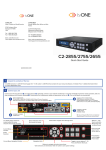

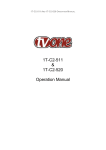
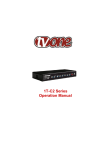
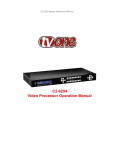
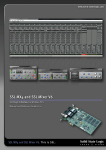
![KNA-G520 - [::] Kenwood ASC](http://vs1.manualzilla.com/store/data/006789385_1-ebacec2ef57bc4bed2b4240863ba101e-150x150.png)

